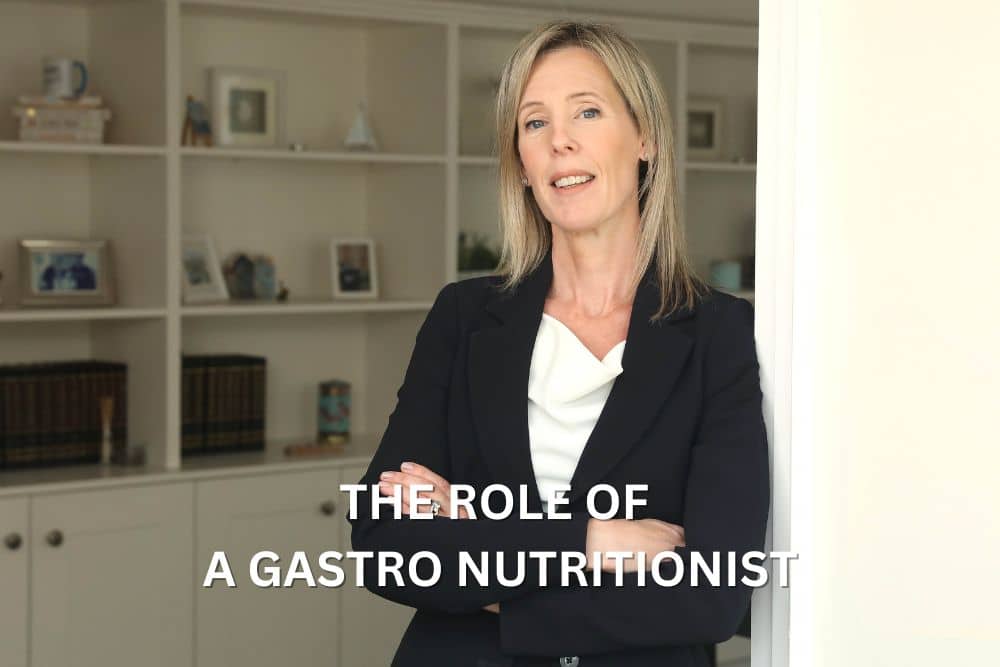
The Role of a Gastro Nutritionist
Your Partner in Digestive Health and Wellness
In the complex world of digestive health, a gastro nutritionist stands out as a beacon of specialised knowledge and support. If you’ve been grappling with persistent digestive issues or simply want to optimise your gut health, you might have come across this term.
But what exactly is a gastro nutritionist, and how can they help you?
Let’s delve into this topic and explore the most asked questions about gastro nutritionists and their role in promoting digestive wellness.
What is a Gastro Nutritionist?
A gastro nutritionist, also known as a gastrointestinal nutritionist, is a healthcare professional (Dietitian) who specialises in the relationship between nutrition and digestive health. They combine in-depth knowledge of the digestive system with expertise in nutrition to help individuals manage various gastrointestinal conditions and optimise their overall digestive health.
What qualifications do they have?
The minimum requirement is a BSc Hons in Dietetics or a related science degree with a postgraduate diploma or higher degree in Dietetics. Dietetic courses are structured to include biochemistry, physiology, applied sciences and research methods which underpin nutrition and dietetics.
It can be confusing who to select but it is important to know that a Dietitian can also call themselves a nutritionist – a nutritionist CANNOT call themselves a Dietitian.
What Does a Gastro Nutritionist/Dietitian Do?

What Does a Gastro Nutritionist/Dietitian Do?
A gastro nutritionist’s role is multifaceted. They work with clients to:
- Assess current dietary habits and their impact on digestive health
- Develop personalised nutrition plans to manage specific digestive conditions
- Provide education on the relationship between diet and digestive health
- Offer guidance on appropriate supplements
- Support clients in making sustainable dietary changes
- Collaborate with other healthcare professionals to ensure comprehensive care
Who Can Benefit from Seeing a Gastro Nutritionist?
A wide range of individuals can benefit from the expertise of a gastro nutritionist, including:
- Those diagnosed with specific digestive conditions (e.g., IBS, IBD, GERD)
- Individuals experiencing persistent digestive symptoms without a clear diagnosis
- People looking to optimise their gut health and overall wellbeing
- Those with food intolerances or allergies affecting their digestive system
- Individuals recovering from gastrointestinal surgeries
- Anyone seeking to improve their relationship with food and eating habits
Now, let’s address some of the most commonly asked questions about gastro nutritionists:
Q: What is the difference between a Nutritionist and a Dietitian
A: Dietitians are trained as specialists in Nutrition not only for all aspects of improving diet and health but for medical health conditions. They are qualified with BSc/MSc and work in all aspects of healthcare in Hospitals, community and private practice to name a few.
Nutritionists however are not all qualified and do not work in hospitals as they do not have medical/ specialised training. In general, they help patients gain an understanding of how nutrients impact their bodies and can help develop healthy eating plans around that understanding.
Q: How is a gastro nutritionist different from a regular nutritionist?
A: While all nutritionists/ Dietitians have a broad understanding of nutrition, a gastro nutritionist/Dietitian has specialised knowledge about the digestive system and how different foods and nutrients interact with it. They are particularly skilled in managing digestive health conditions through dietary interventions.
Q: Do I need a referral to see a gastro nutritionist?
A: In most cases, you don’t need a referral to see a gastro nutritionist. However, if you’re seeking treatment for a specific medical condition, it’s a good idea to consult with your GP or gastroenterologist first.
Q: What can I expect during my first appointment with a gastro nutritionist?
A: Your first appointment will typically involve a comprehensive assessment of your medical history, current symptoms, dietary habits, and lifestyle factors. The gastro nutritionist will use this information to develop a personalised nutrition plan tailored to your specific needs and goals.
Q: How long will I need to work with a gastro nutritionist?
A: The duration of treatment varies depending on your individual situation and goals. Some people might only need a few sessions, while others may benefit from ongoing support. Your gastro nutritionist will discuss this with you based on your progress and needs.
Q: Can a gastro nutritionist help with weight management?
A: Yes, many gastro nutritionists can assist with weight management, especially when it’s related to digestive health issues. They can help you develop a balanced, gut-friendly approach to weight management.
Q: Will I need to follow a very restrictive diet?
A: Not necessarily. While some conditions may require temporary dietary restrictions, the goal is usually to develop a balanced, varied diet that supports your digestive health. Your gastro nutritionist will work with you to find an approach that’s both effective and sustainable.
Q: Can a gastro nutritionist help with food intolerances?
A: Absolutely. Gastro nutritionists/Dietitians are well-equipped to help identify and manage food intolerances. They can guide you through elimination diets and help you develop a nutritionally balanced diet that avoids trigger foods.
Q: How does a gastro nutritionist differ from a gastroenterologist?
A: A gastroenterologist is a medical doctor who specialises in diagnosing and treating digestive disorders. A gastro nutritionist/Dietitian, on the other hand, focuses specifically on the role of nutrition in digestive health. Often, these professionals work together to provide comprehensive care.
Q: Can a gastro nutritionist help with conditions like IBS or IBD?
A: Yes, gastro nutritionists/Dietitians are particularly skilled in helping manage conditions like Irritable Bowel Syndrome (IBS) and Inflammatory Bowel Disease (IBD) through dietary interventions.
Q: Will I need to take supplements?
A: This depends on your individual situation. If you have nutrient deficiencies or specific health concerns, your gastro nutritionist might recommend certain supplements. However, the focus is usually on obtaining nutrients through a balanced diet where possible.
Q: How quickly can I expect to see results?
A: The timeline for improvement can vary greatly depending on your specific condition and how closely you follow the recommended plan. Some people notice improvements within a few weeks, while for others, it may take several months to see significant changes.
Q: Can a gastro nutritionist help with issues like bloating and constipation?
A: Yes, these are common issues that gastro nutritionists are well-equipped to address. They can help identify potential dietary triggers and suggest strategies to alleviate these symptoms.
Q: Is working with a gastro nutritionist covered by insurance?
A: Coverage varies depending on your insurance provider and plan. It’s best to check with your insurance company directly. Some plans may cover nutritionist services, especially if they’re recommended by your doctor for a specific medical condition.
Q: Can a gastro nutritionist help with gut-related skin issues?
A: Yes, there’s a growing understanding of the gut-skin connection. A gastro nutritionist can help address gut health issues that may be contributing to skin problems.
The Importance of a Gastro Nutritionist in Your Health Journey
In today’s world, where digestive issues are increasingly common, the role of a gastro Dietitian/nutritionist is more crucial than ever.
They offer a unique blend of nutritional expertise and specialised knowledge of the digestive system, providing a holistic approach to gut health that goes beyond simply treating symptoms.
Working with a gastro dietitian/nutritionist can be particularly beneficial if you’ve been struggling with persistent digestive issues that haven’t responded to general dietary advice. They can offer a more nuanced, personalised approach, taking into account your individual symptoms, medical history, and lifestyle factors.
Moreover, a gastro nutritionist can be an invaluable partner in your long-term health journey. They can help you develop a positive, sustainable relationship with food, teaching you how to nourish your body in a way that supports optimal digestive function and overall wellbeing.
Remember, good digestive health is about more than just the absence of symptoms. It’s about feeling energised, comfortable, and confident in your body. A gastro nutritionist can help you achieve this, providing the knowledge, support, and personalised guidance you need to take control of your digestive health and enhance your quality of life.
Whether you’re dealing with a specific digestive condition, looking to optimise your gut health, or simply want to develop healthier eating habits, consider partnering with a gastro nutritionist. With their specialised expertise and patient-centred approach, they can be your guide on the path to better digestive health and overall wellness.
If you want to book your programme TODAY we would love to help you.
You can book a 121 Dietitian Programme today by clicking on the link below
Links included in this description might be Amazon affiliate links. If you purchase a product or service with the links that I provide I may receive a small commission.
